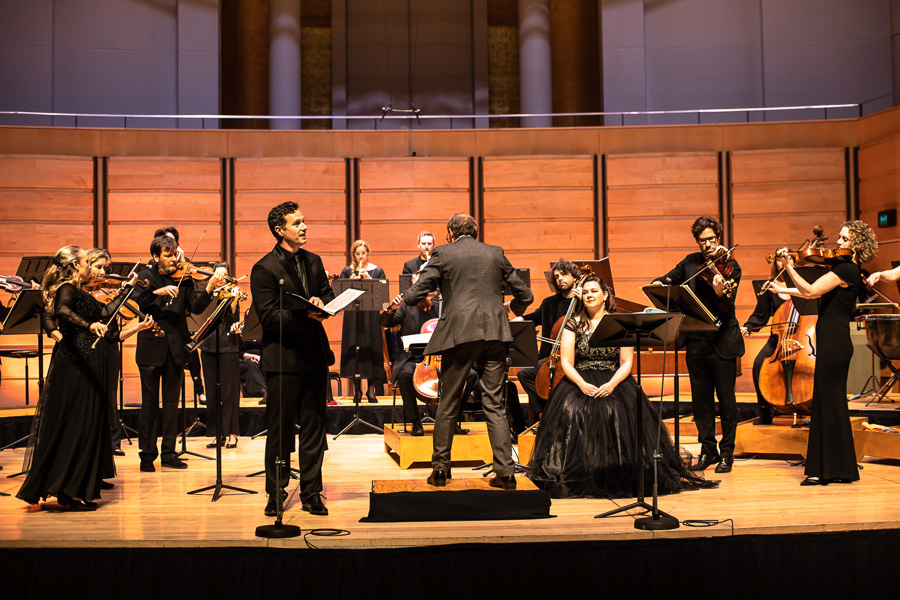Symphonies from three Classical families.
This concert was in large part an exploration of the form of the early Classical symphony, and in a way that foregrounded the lesser-known scions of prominent musical families – the Mozarts, the Haydns and the Bachs.
The concert began, rather fittingly, with Johann Christian Bach’s Symphony in G minor Op 6 No 6. It is at once forceful and brooding – Storm und Drang at its finest. The orchestra performed the first movement at a spectacularly lively tempo, under Roland Peelman’s equally-lively direction. None of that passion is lost in the slower Andante. Though it is an unusually long symphonic movement, the orchestra kept the audience on their toes by lulling them at one moment and lifting them out of their seats at the next with stark dynamic variety and control. And this is to say nothing of the unrelenting Allegro molto, with its shimmering tremolos and fiery dialogues between the violins and Daniel Yeadon and Antony Albrecht on cello. The whole character of the piece is summed up in the surprising ending – not so much a whisper as a whimper.
Then came Mozart’s arias. The distinctive clarity of Andrew Goodwin’s tenor voice – which never wavered, even in the turbulent passages on ‘ingrata’ – is perfectly suited to ‘Va dal furor portata’. Mozart’s sense of humour is notorious. It is on full display in the next aria – ‘Clarice cara mia sposa’. The audience is forewarned by the description ‘aria buffa’. What follows is a whimsical verbal frenzy by Goodwin, with sharp articulation, before Peelman suddenly interjects as the angry interlocutor.
With Jacqueline Porter’s performance of ‘Aura che intorno spiri’ comes a change of temper. Her enchanting voice was a perfect match for this more contemplative aria, with its extended musings on ‘fedele’ and ‘fidar’. A particular highlight was her execution of the tortuous and highly-embellished melody accompanying ‘fidar’.
Goodwin returned for the solemn ‘Misero o sogno’. It is an emotionally varied aria. The sudden exclamation ‘Adrite…questa porta infernale’ recalls the famous opening of Don Giovanni, both thematically and musically, and Goodwin’s dynamic control is showcased in the hushed farewell – ‘l’ultimo addio’.
Porter finished off the arias with ‘L’amero, saro costante’. Skye McIntosh, accompanying on violono principale, made her instrument on equal footing with the human voice, and the dialogue gave the impression of a friendly discourse between equals. There are yet more examples of word-painting here – with Porter singing a delightfully wistful, almost sighing, rendition of ‘sospirero’, with all those distinctive two-note slurs, or ‘Viennese Sighs’, given to both voice and violin.
After a short interval came the ‘Overture’ to Michael Haydn’s Die Hochzeit auf der Alm. The overture is true to its name, by opening with something of a hunting call for Carla Blackwood and Doree Dixon on horns.
But Leopold Mozart’s Cassation in G major (Toy Symphony) was in another league altogether. It is a whimsical symphony, though (unlike his son’s ‘Musical Joke’) not undeserving of technical merit, featuring children’s toys – percussive and wind. Violist James Eccles doubles on recorder, and the most humorous feature was a simple but persistent motif on recorder (performed by Melissa Farrow), which appeared in one form or another in each and every movement. This is not to exclude Chad Kelly’s humorous sung interjection which was like something out of a boozy quodlibet – perhaps a fitting follow-on from Haydn’s wedding symphony. The Mozarts, it seems, had a predilection for all things irreverent, whimsical and tongue-in-cheek.
Haydn’s Symphony No 82 in C Minor (‘The Bear’) was a fitting way to end. The second movement featured something of an instruction on the art of variation, and the third a delightful shift between dance metres.
